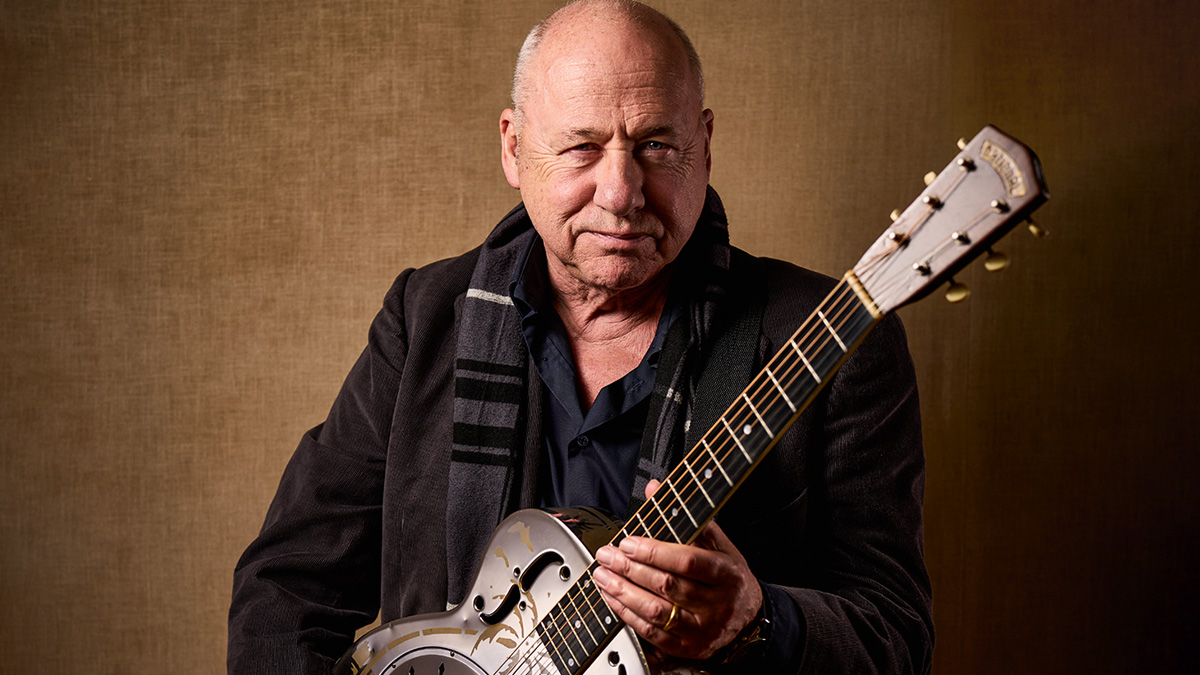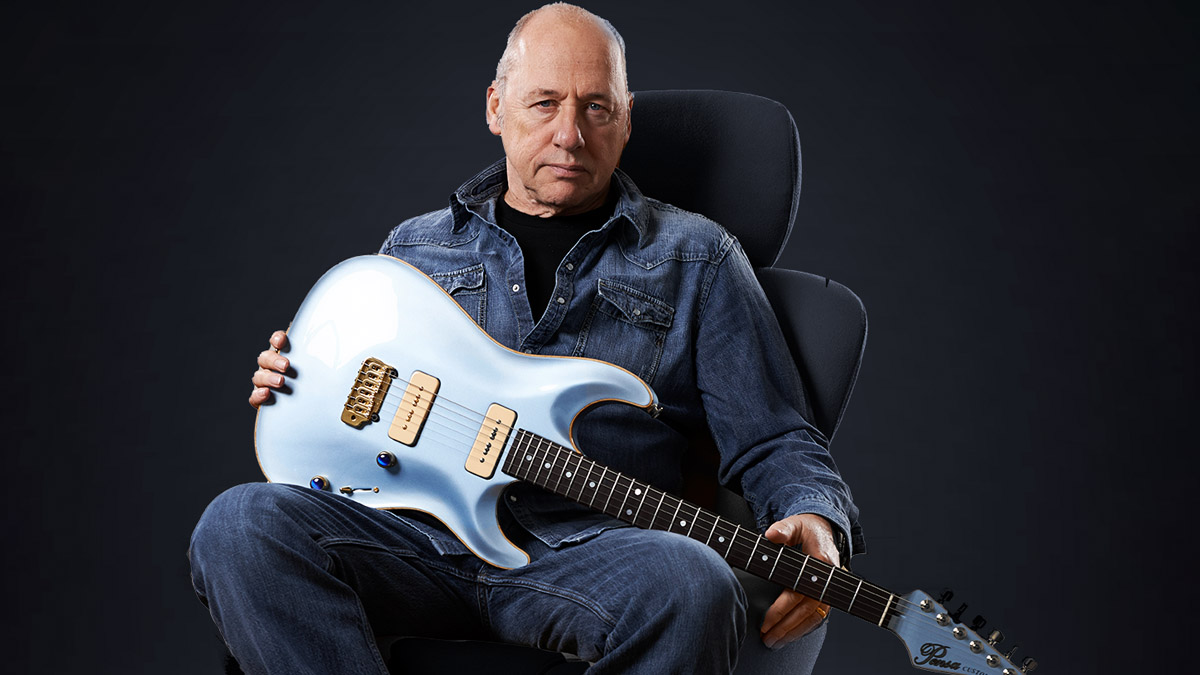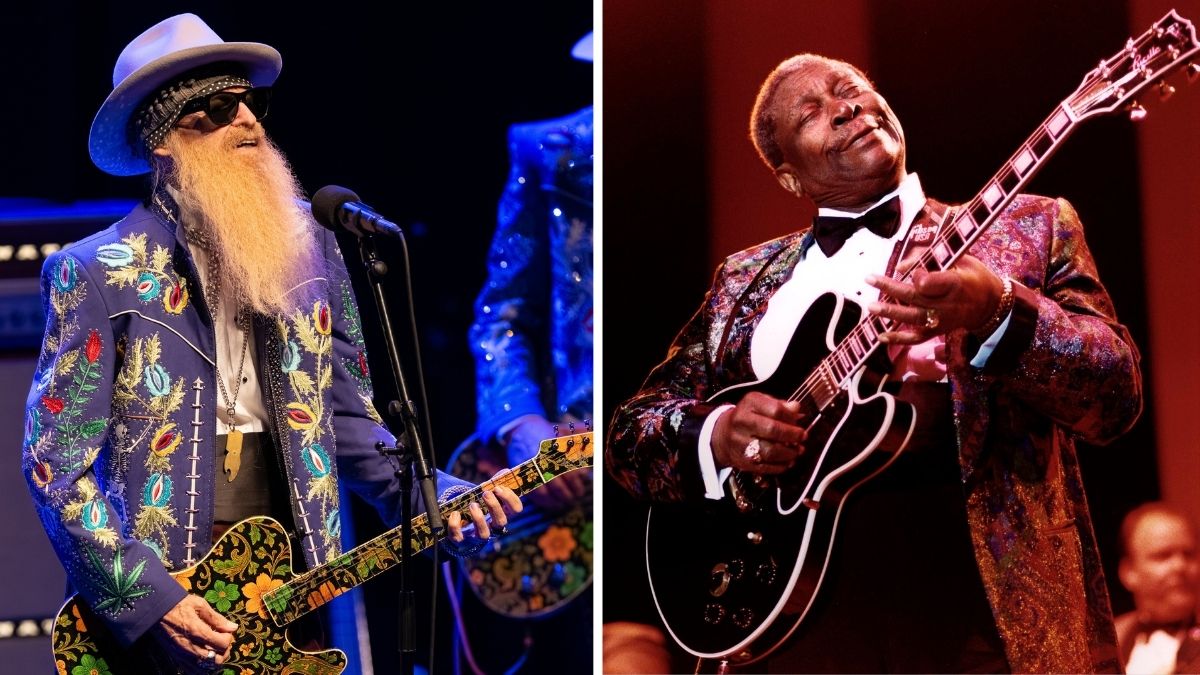“You couldn’t sell them and you wouldn’t want to sell them because they’d be just too hard to say goodbye to”: Mark Knopfler on the guitars he couldn't bear to part with, and the six-strings that surprised him on One Deep River
On the back of his stirring new album, the guitar icon discusses the primacy of songwriting, and how his relationship with the instrument has changed

All the latest guitar news, interviews, lessons, reviews, deals and more, direct to your inbox!
You are now subscribed
Your newsletter sign-up was successful
This April will see the release of Mark Knopfler’s 10th solo album since he struck out on his own with Golden Heart in 1996. Dire Straits had disbanded the year before and you’d have been forgiven for thinking, at that moment in time, that his best years were perhaps behind him. But it says much of Knopfler’s musical integrity that both the depth and quality of his work have only improved in the 30 years that have passed since then.
In fact, listening to his latest album, One Deep River, you get a sense of an artist who – strange as it might seem to say – has quietly revealed the real mettle of his songcraft in his post‑Straits solo work.
Money For Nothing may have made him a household name, but ballads such as Matchstick Man from his 2018 album, Down The Road Wherever, or Basil, from 2015’s Tracker, are masterpieces of powerful, mature ballad writing. There’s humility, grace and nuance in their unhurried stories and poignantly phrased guitar lines that hold the listener’s attention like a fireside story or a personal confession.
So it was all the more intriguing to learn that, just after selling the majority of his guitar collection at Christie’s in London for a record total (25 per cent of which went to charity) in January, he announced a new album, One Deep River, to be released on April 12. Would this be a swan song, then? A final statement on his life in music? Happily the answer seems to be ‘no’ – but it’s fair to say that the album’s songs cast longer shadows than those of his previous two records.
Thematically, the album is full of departures – from relationships, from towns, from life itself – and its 12 tracks are haunted by the uneasy presence of mobsters, scam artists and stick-up men. Yet the songs are as unhurried and beautifully performed as ever, while the addition of slide maestro Greg Leisz lends it some of the melancholic grandeur of a movie soundtrack set somewhere in the American West.
And, of course, it has those unmistakable moments of guitar that only Knopfler seems to be able to deliver, saying much with just a few notes that always make the listener feel something, rather than just another ego-buffing solo.
My guitar playing has become a real passenger. So when I sit down to look at songs, I’m always just looking at lyrics; that’s where I am, really. I tend to be more interested in the song that I’m just writing
And yet joining Mark to talk about the album we find him – perhaps surprisingly for a man who’s a hero to so many players – musing on what he calls his “rusty” technique and ongoing struggles to stay engaged with playing the guitar while he works on the deep craft of lyric writing.
All the latest guitar news, interviews, lessons, reviews, deals and more, direct to your inbox!
Introspective yet frank, his thoughts on where he’s at with guitar and music are as absorbing as the new album, so join us as we wade a little deeper into Knopfler’s views on music, guitars, and recording.
Congratulations on the album. It feels like you’re playing more Strat on it, such as on the single Ahead Of The Game, than we’ve heard from you for a while.
“Yeah, I think that was the old ’54. Oh, I’m sure it’s a pretty backward kind of an approach. But, you know, I’ve always been a soft touch for something like that – a little figure [simple melodic pattern] like that.”
Does a Strat still feel like ‘home’ to you after all these years, given that there’s another big strand of your work that’s played with Gibson electrics and the like?
“I think I’m equally at home with either. I mean, not that I’m at home with [any] guitar now. I’ve looked at so many words over the past few years, through the pandemic and beyond, that I’m hardly playing.
“My guitar playing has become a real passenger. So when I sit down to look at songs, I’m always just looking at lyrics; that’s where I am, really. I tend to be more interested in the song that I’m just writing, a song that I’ve just finished writing, or the song that I’m just in the middle of writing. So that’s where I’ll be and it won’t be practicing [guitar]. So I’m afraid that’s the truth of it.”
Do you find that as time goes by there’s more you want to write about – in terms of subject matter – or, in fact, less?
“Well, I’ve certainly been writing more songs and I don’t know whether that was to do with the pandemic or not, or because I just had more time. But it certainly hasn’t helped my playing any. The musician part [of me] is much reduced, I think, but the writer part is as strong as ever. If a song wants to be born, then I try to let it happen, but I think the playing has deteriorated a little bit…
“I’d [find I’d] be ready to sit down and look at a song on the computer, but I wouldn’t be playing enough. But that’s just something that seems to have happened recently, and I should really take steps to spend more time behind the instrument, to just get playing. It’s not that I’ve forgotten how to play it – I’m just rusty.”
Guitar is funny – it kind of waxes and wanes a bit in every player’s life. It’s a real lifelong relationship, with ups and downs.
“It is, and it’s often how you just start off. So the first good move for me is to get the damn thing out of the case. Certainly, for me, if it’s in the case I’ll often just start looking at the song, rather than looking at the guitar.
“So I’ll try to keep an acoustic and an electric on stands so that I can just reach for them and play and I don’t have to start picking up the case, hitting somebody’s chair with it, getting the guitar out, knocking something off another stand as you’re sitting down again…
“The whole thing is just kind of cumbersome. So I like to have a couple of guitars out of their cases and on stands, and that way they’ve got a fighting chance of getting played.”
Your 2015 album, Tracker, was full of songs about people who could be described as unsung heroes, such as the Irish laborer in Mighty Man or the poet Basil Bunting. By contrast, the new album has a lot of villains in it, such as the murderous train robbers on the track Tunnel 13. Why?
“I don’t know… I suppose it may be just getting older and looking at the world. And I suppose, even in terms of social history, I’ve been looking at a certain period, which was a kind of a pivotal time in Britain. I wrote a song once called 5:15am. It was about a miner coming onto his shift and he came across this car, a big Jag Mark X, and inside it was a man whose body was full of bullet holes.
“This was the introduction to the Northeast of that kind of gangland killing, which was really about the fruit-machine [racket] that had come up from London. And so in a roundabout way, I suppose I’ve been reading about that period.
I wrote a song once called 5:15am. It was about a miner coming onto his shift and he came across this car, a big Jag Mark X, and inside it was a man whose body was full of bullet holes
“There was a revolution in Cuba and the mob had to do a quick reverse out of there and start up again, and London was the kicking-off point. So then the nightclub scene changed and the Gambling Act was brought into place so that those guys could start operating…. I’d started to read about that stuff way back a couple albums ago, and it’s still an interesting period to me. A lot of people lost their innocence during that time. Sometimes they lost their bank accounts, too [laughs].
“Actually, there were some extra tunes from this album and I suddenly realized that I could take four of those songs and make them into an EP [The Boy], which is yet to come out. It’s just songs that combine thematically, about the fairgrounds and showgrounds and the vanishing boxing booths [boxing booths pitted veteran fighters who journeyed from town to town against onlookers brave enough to challenge them in the ring – Ed].”

“There were once many, many hundreds of them, but they were trying to introduce the British Boxing Board Of Control to control it more – and also the showground culture.
“I was always fascinated by the fairground that came to Newcastle once a year when I was a boy and, of course, it had its boxing booth, too – so that time was quite interesting. There’s a song on the EP called Mr Solomons Said and a song about a bad day for a knife thrower and [narratives about] people who were attracted to the bright lights of London, maybe like the boy who’d cycled in from the countryside. So it’s just where I’m at now.”
You called the album One Deep River. What does it mean to you?
“Well, what does it mean to you? It could be a description of a person, or it could be a description of the river itself. So, you know, I like the idea of it being available across the range [of possible meanings].”
With lyrics, you have to leave a certain amount open to interpretation by the listener. Otherwise, it becomes a bit trite.
“Yeah, that’s right. And very often, you know, if you try to explain the song to somebody, I’ve found that just gets you in deeper.”
The album also sounds like the most Americana-influenced record you’ve done in a while, on tracks like Janine and Before My Train Comes. The superb lap steel playing from Greg Leisz certainly evokes that melancholy Western feeling. Would it be fair to say that’s a theme?
“Yeah, well, it’s never very far away. Greg is a phenomenal player and straight away it felt as though he’d been with us for a long, long time so he didn’t need to become assimilated – it was an instantaneous thing. With this band, it’s the high point of a year when they get together and, with Greg, it was just more of that. I don’t give directions [to musicians like him]…
“If you’re directing Colin Farrell or someone you don’t say, ‘I’d like you to walk over to the window, lean out and then I’d like you to scratch your head and look as though you don’t know what you’re doing…’ That’s the last thing you would tell a good actor to do.
“Because what he would be doing would be thinking about a possible approach, thinking about things that might or might not work, and possibly discussing it with you at some point but not needing to have a set of directions put in his lap.
“And it’s the same thing with these guys. I just sing them the song and leave them to it, really, and then just keep an eye on what’s unfolding and maybe nudge things in certain directions, possibly. But that’s part of the joy of it – welcoming people into your song and them finding their place in it themselves, rather than being told where to go and sit.”
When working with really great musicians, it can be a pleasure to surrender control and just enjoy letting them react to the song instinctively.
“You’re so right – that’s part of it, part of the joy of it. I think these guys, they just take it for granted now that they’ll be skating on their own for a bit, you know, and they’ll just be finding out that they’ll be listening to each other as well, as much as anything else.
That’s what musicians love more than anything else – when you’re playing with someone who has heard what you’ve done, what you’ve changed, and has changed their path without mentioning it, just adapted to your change with no words
“You have to be able to seamlessly fit in with all the existing textures and that takes a certain amount of time and experience and confidence in what it is that you’re doing. If I change my part, you can be sure that the band will hear it and will mark that change and play according to it. But you probably won’t even have a discussion about it with anybody.
“That’s what musicians love more than anything else – when you’re playing with someone who has heard what you’ve done, what you’ve changed, and has changed their path without mentioning it, just adapted to your change with no words – no words necessary. It’s a wonderful gang to be part of and it makes all the other times worth it – because a lot of times you’re just struggling. But when it comes clear like that, it’s tremendous.”
There’s some beautiful acoustic guitar parts on the album – and we couldn’t help noticing that your lovely pre-war Martin D-18, which featured on the last album, Down The Road Wherever, wasn’t up for sale at the recent Christie’s auction of your guitars.
“Well noticed. That’s a ’35 D-18 that was given to me by a good friend. That guitar, the D-18, will have got on a lot of songs up to this point. But I found another little guitar that seems to have gotten onto a few songs on this album, taking that role, and it’s a little mahogany parlor guitar made by Arthur Boswell.
“It just seems to have answered for some songs on this record and I don’t know how many tracks it’s actually on, but it’s four or five. That’s become the guitar of this album.
“The song Tunnel 13 mentions redwood, but it’s not actually a redwood-top guitar [being played], although Boswell makes beautiful redwood guitars – and, in fact, I’ve got one and they’re lovely. But this one’s a mahogany guitar and it seems to have spoken on a few songs quite nicely. Quite why that should be I’ve no idea. I’m looking forward to working with the redwood [guitars by Boswell] and seeing where that goes to – but until I sort of test them in the songs, I won’t really know.”
When it comes to recording an album in the studio, the guitars that actually make it onto a record aren’t always the ones you go into the studio meaning to use. Have you experienced that before – been surprised by how central an unexpected guitar became to the sound of an album?
“I certainly have – I remember the Grosh Electrajet doing that. With this album, it was the Duesenbergs. Because I bought two, I have a Caribou and a Gran Royale. They’re great guitars, I’ve found that they just went straight onto records and I didn’t expect them to sound as good as they did. But they’re great instruments and I haven’t even scratched the surface yet with them.”

You’ve spoken a fair bit about your motivation for auctioning much of your guitar collection at Christie’s earlier this year. But what about the guitars you decided to keep? Why did you decide to hang on to some guitars in particular?
“Partly it’s sentimental, but also I wanted to have enough left to record with, you know? Enough that I’d be happy to be recording with in years to come. So I need to have a few of those. Also, I’ve got a son who plays guitar – actually, both boys play guitar – and a daughter who plays guitar. So I wanted some stuff left for the kids to enjoy playing as well.
“Plus, you want to hang on to things that are family heirlooms, really. Like the National that Steve Phillips played – that was Steve’s National and I treasure it; and that was the Romeo And Juliet National – but it’s the same thing for Strat Number One from Sultans, so I am careful about that.
There will be guitars like that. You couldn’t sell them and you wouldn’t want to sell them because they’d be just too hard to say goodbye to
“There’s things that you get really closely attached to. For example, I got to be good pals with Tony Joe White and… he gave me his ES-330 that he used for Rainy Night In Georgia and Groupie Girl and all of those things. I said, ‘You can’t give me this thing…’ but it was under his bed and covered in dust and the fingerboard was pitted so deeply from his sweaty gigs that it needed a new fingerboard anyway.
“So I got a new fingerboard for it and I use that 330 on every record that I make now; it’s just become part of the scenery. So, again, some guitars are just that little bit special that they work their way in, you know? Or like the Martin D-18 I mentioned before, there will be guitars like that. You couldn’t sell them and you wouldn’t want to sell them because they’d be just too hard to say goodbye to.”
You recently made a special recording of the theme to the Local Hero movie, Going Home, which ended up featuring the better part of the world’s top guitarists on it. It’s such a memorable and timeless melody. Where do those powerfully emotive, Celtic-sounding lead lines come from, with you? They feel like a really important part of your musical DNA.
“A melody like that just resonates with childhood for me because of listening to Jimmy Shand and Scottish country dance music when I was small. I think that was among the earliest music I would have heard in Scotland. I’m more or less half-Scottish so it’s in the genes already on my mother’s side, who are just a family essentially of Scottish Geordies.
Lyrically, I’m still interested in trying to improve as a writer – I like the idea of writing a good song: the challenge being to do that and the other challenge being to make a good record of it
“There’s a lot of links between the Geordies and the Scots; a lot of Scots moved down to Newcastle to work in the shipyards and in heavy industry. So when I’m writing in that vein, it doesn’t seem like it’s a foreign language to me at all.
“Sometimes [Scottish] musicians will say, ‘Oh, that’s very West Highlands, Mark,’ or ‘That’s Strathspey that you’re playing there, Mark…’ And I’ll say, ‘That what that I’m playing?’ So you live and learn. But anyway, I’m reasonably at home with [those musical traditions] and they don’t seem like a foreign country to me.”
There are often distinct chapters in every person’s life that can be quite different from each other. Musically speaking, do you feel that way about your own work over the years?
“No, I think the ditties [sic] are pretty much nursery rhymes and they haven’t really changed musically. I haven’t been too interested in improving that side of it. There was a spell a few years back when I was in New York a lot of the time and I was kind of interested in learning how to play a little better, just to learn a bit more about the music game. But generally speaking, it’s the same old nursery rhyme; so, no, I don’t think so.
“But, lyrically, I’m still interested in trying to improve as a writer – I like the idea of writing a good song: the challenge being to do that and the other challenge being to make a good record of it. Gillian Welch once said to me that, ‘All I’m trying to do is write a good song and make a good record of it,’ and I thought to myself, ‘Well, I’ve never heard a better explanation of the process,’ and it’s all that matters.”
- One Deep River is out now via EMI.
Jamie Dickson is Editor-in-Chief of Guitarist magazine, Britain's best-selling and longest-running monthly for guitar players. He started his career at the Daily Telegraph in London, where his first assignment was interviewing blue-eyed soul legend Robert Palmer, going on to become a full-time author on music, writing for benchmark references such as 1001 Albums You Must Hear Before You Die and Dorling Kindersley's How To Play Guitar Step By Step. He joined Guitarist in 2011 and since then it has been his privilege to interview everyone from B.B. King to St. Vincent for Guitarist's readers, while sharing insights into scores of historic guitars, from Rory Gallagher's '61 Strat to the first Martin D-28 ever made.










